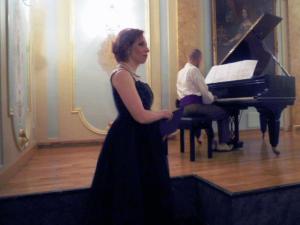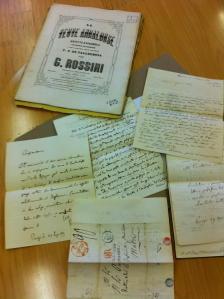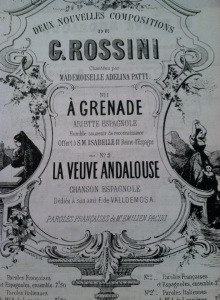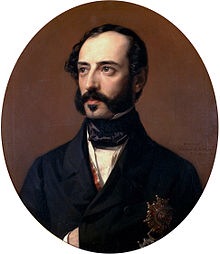When I first started my search of songs by G. Rossini that where themed either by text, rhythms or dedications to Spain, I found in my Belwin Mills Edition a song called “La veuve andalouse, chanson espagnole”. Although recorded recently by the Italian mezzo and Rossini virtuoso Ana Bonitanibus in the French, my friend the Mexican mezzo Carla López Speziale had recorded the version in Castilian of this piece back in 2004 in her album Soirée Musicale: Canciones de Rossini with pianist Sergio Vázquez (JBCC 098). In 2012, this song was firmly in my program Rossini and Spain, which I did in Malta in 2012.

Emilio and I at the Museo del Romanticismo of Madrid, where we first performed the recital and project “Rossini and Spain”.
Lacking the edition with the Spanish text, at first I took the words directly from the libretto of Carla’s album Soirée Musicale and superimposed it on my French edition. While I was in Madrid in June of 2012 and before going to Malta for the concert, I went to the Royal Conservatory of Madrid were my colleague and pianist Emilio González Sanz teaches. In the conservatory they had an antique edition of La veuve andalouse, which I was unable to photocopy because of its fragile condition. This antique edition had this songs as No. 2 of a set of two, entitled Deux Nouvelles compositions. Although the French version, with text by Emilien Paccini, has the title as La veuve andalouse, the Spanish title is slightly different, La viuda de náufrago or “Widow of the drowned man”.
This edition is among the many things the library at the Royal Conservatory in Madrid has pertaining to Rossini, including original letters in his own hand writing and two small original compositions. One of the hidden anecdotes of history is that Rossini was asked by Mstro. Piermarini, one of many Italian musical personalities in Spain that worked for various noble families as well as in the Royal Palace (he was one of the voice teachers to the royal house in Spain), via the Spanish Queen Maria Cristina, to inaugurate the newly formed Royal Conservatory of Madrid.

Edition of “La veuve andalouse” and various letters written by Rossini from the library archive at the Royal Conservatory in Madrid.
I was advised by Carla to obtain a copy of an antique edition from Glendower Jones at Classical Vocal Reprints, but it was not until I got in touch with Mr. Reto Müller, the director of the Rossini Gessellschaft in Switzerland that I obtained a modern performing edition of the song with the text in Castilian. The texts in Spanish of both songs of Deux Nouvelles Compositions are by the romantic era Spanish playwright Ventura de la Vega, one of the tutors to the Queen as well as one of the directors of the Spanish national theater of the time, “El Teatro Español”
Here is the text both in Spanish and in my own English translation:
¿Qué has hecho, dime, horrible mar,
de aquella prenda de mi amor?
¿Cómo pudiste arrebatar
mi bien amado en tu furor?
Su frágil barquilla
partió de esta orilla…
¡Ah! Dónde va su quilla?
¡Nunca ya volverá!
Gran Dios, de mi amargura
calma el cruel rigor;
de tanta desventura
cesa el fatal rigor;
Mas! O Dios. Tú que sabes,
¿pero no me engañé?
!Ah! tu, mar funesta,
¿será locura dudar?
Esta desesperación
me ha de matar.
La feliz barquilla,
nunca más tu quilla
¡ah, del amada orilla
la arena hallará!
¡Ah! niño desdichado!
Ah, huérfano has quedado,
fruto del amor y el dolor.
Ah, del paterno beso,
ah, dulce embeleso,
tu infantil mejilla ya no gozará.
¡Ah, todo acabó, todo murió!
Infeliz barquilla…
¿Qué has hecho…
The Andalusian Widow (Spanish Song) English Translation
What have you done, tell me, horrible sea,
with that sweet love of mine?
How could you have snatched away
my beloved with all your furor?
His fragile little boat
set sail from this shore;
where now goes its keel?
Never more will it return!
Great God, relieve the harshness
of this cruel bitterness of mine;
cease the fatal severity
of so much misfortune.
But, O God, you that know,
am I wrong in what I think?
Ah, fatal sea that you are.
Is it madness to doubt
this feeling of despair
that will be the end of me?
That happy little boat,
ah, never more will your keel
touch upon the sand
of this beloved shore!
Ah, my unfortunate child,
fruit of love and pain,
an orphan you have become.
Ah, never more, my little delight,
will your baby cheek enjoy
that sweet paternal kiss,
Ah, all is done…all is dead!
Unhappy little boat…
What have you done, tell me, horrible sea…
Apparently the Italian diva (but born in Madrid!) Adelina Patti must of sang this as a “party piece”, as a third edition I acquired by Oliver Ditson has printed on the fronstpiece “as sung by Adelina Patti”. The song dedication reads as follows: “A mi amigo y colega F. F. de Valldemosa, distinguido compositor, profesor del Real Conservatorio de Madrid y colega de la Academia Francesa”. An engraving and brief description of this figure is in the internet; he was a composer and voice teacher from the island of Mallorca; in the Petrucci Library there is a bolero for two tenors and piano of his that can be downloaded. La viuda del náufrago is filled with Spanish connections and history that links Rossini to Spain…
The song is virtuosic and difficult; it is set up as dramatic “scena” for a mezzo with great high notes and coloratura. The piano part has difficult rapid scale and triad dissonant passages that use almost the whole range of the piano, with dissonances and quick changing character that mirror the grieving widow. Over 6 minutes long, its a test of endurance and range for both the pianist and singer. Its also a show stopper and great piece. Joining my friend Carla’s recording, Ms. Bonitanibus as well as Marilyn Horne (RCA) and Vivica Geneux (EPCASO) recordings of the text by Ventura de la Vega of “A Granada”, my version with pianist Emilio González Sanz is featured in my upcoming disc España alla Rossini which is slated to come out with iTinerant Classics this coming April of 2015.



